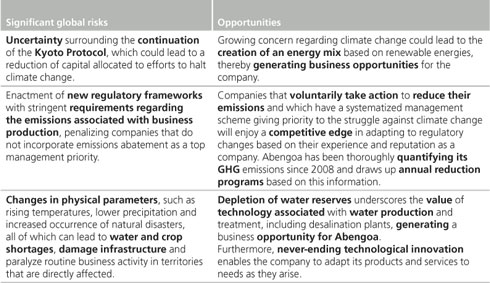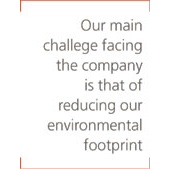 Abengoa
Abengoa
Annual Report 2012
- Corporate Social Responsibility
- Environment
As part of its unwavering commitment to sustainability development, inherent to the very existence of Abengoa, environmental protection plays an essential role, for the former could not exist without the latter. Thus, the main challenge facing the company is that of reducing its environmental footprint through more efficient products and processes.
The major global challenge related to environmental protection is without a doubt the struggle against climate change. Abengoa, conscious of this, quantifies all of the emissions linked to its activities, which enables the company to set annual reduction targets.
Population growth, improved living conditions in developing countries and climate change are going to bring about significant changes in the demand for natural resources. Conscious of this transformation, at Abengoa drinking water is produced from sea water; aluminum and zinc are recycled, thereby preventing primary extraction; industrial wastes are managed for subsequent valorization and to minimize their environmental impact; solar thermal power plants are built and operated; biofuels are produced; and investment is made in technological development of new ways to produce renewable energies.
For all of these reasons, with a view to addressing the challenges this transformation entails, Abengoa has analyzed and assessed a series of global and specific risks and opportunities that are directly associated with climate change. This will serve to a better manage of such opportunities and risks and anticipate future adverse situations.

In 2011 Abengoa developed a methodology for analyzing risks associated with climate change that enabled the company to assess the impact on the technologies it operates: marine energy, water desalination, biofuel production, electrical power generation, solar plants and transmission lines, among others.
Based on the premise of an average temperature rise of 2.4 ºC1, specific risks associated with each technology were determined, as well as consequences, probability of occurrence and the measures that would need to be applied in order to mitigate them.

Essential in reducing the environmental footprint is having reliable systems in place to provide pertinent information on the environmental impact of the company’s activity. For this purpose, Abengoa has implemented two specific instruments which, as part of the Integrated Sustainability Management System (ISMS), provide information related to environmental impact: the Environmental Management System (EMS) and the Greenhouse Gas (GHG) Management System.
Note 1: Increase established under the B2 scenario of the Special Report on Emissions Scenarios (SRES) by the IPCC.

© 2012 Abengoa. All rights reserved
